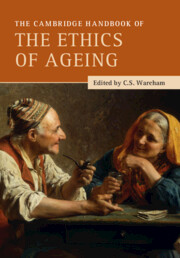
-
Select format
-
- Publisher:
- Cambridge University Press
- Publication date:
- August 2022
- August 2022
- ISBN:
- 9781108861168
- 9781108495134
- 9781108817042
- Dimensions:
- (250 x 174 mm)
- Weight & Pages:
- 0.71kg, 314 Pages
- Dimensions:
- (245 x 170 mm)
- Weight & Pages:
- 0.5kg, 314 Pages
You may already have access via personal or institutional login
Book description
We're all getting older from the moment we're born. Ageing is a fundamental and ubiquitous aspect of life. Yet in ethics, not much work is done on the questions surrounding ageing: how do diachronic features of ageing and the lifespan contribute to the overall value of life? How do time, change, and mortality impact on questions of morality and the good life? And how ought societies to respond to issues of social justice and the good, balancing the interests of generations and age cohorts? In this Cambridge Handbook, the first book-length attempt to stake this terrain, leading moral philosophers from a range of sub-fields and regions set out their approaches to the conceptual and ethical understanding of ageing. The volume makes an important contribution to significant debates about the implications of ageing for individual well-being, social policy and social justice.
Reviews
‘Wareham’s forward-looking concern to develop a differentiated ethics of life-historically varying aging processes in all their breadth is of great importance.’
Hartmut Remmers Source: Ethik in der Medizin
‘Each contribution in this volume demonstrates the authors' profound ethical reflections as well as their intensive engagement with central questions of aging and old age … the proximity to theoretical and empirical lifespan and life course research, and ultimately to cultural-anthropological research, is evident throughout. And this proximity constitutes a special potential of the volume, for it opens up the possibility of integrating central moral and normative questions into the context of more comprehensive aging research. This is achieved in a very convincing and engaging way. The contributions are written in a highly stimulating and inspiring manner.’
Andreas Kruse Source: Zeitschrift für medizinische Ethik
Contents
-
1 - Old Age and the Preference for the Future
pp 9-22 -
-
-
- You have access
- HTML
- Export citation
-
Metrics
Altmetric attention score
Full text views
Full text views help Loading metrics...
Loading metrics...
* Views captured on Cambridge Core between #date#. This data will be updated every 24 hours.
Usage data cannot currently be displayed.
Accessibility standard: Unknown
Why this information is here
This section outlines the accessibility features of this content - including support for screen readers, full keyboard navigation and high-contrast display options. This may not be relevant for you.
Accessibility Information
Accessibility compliance for the PDF of this book is currently unknown and may be updated in the future.


